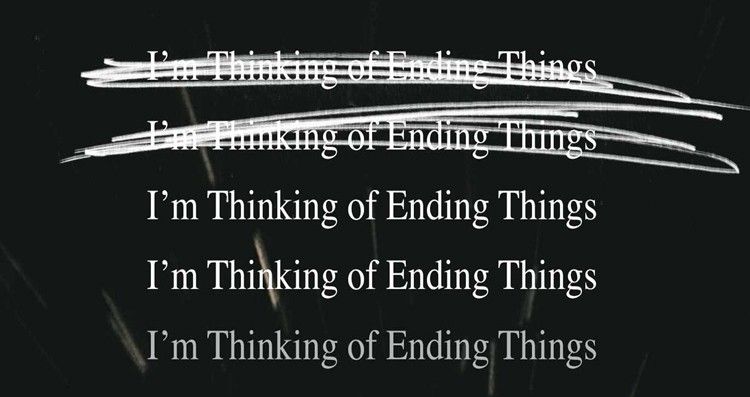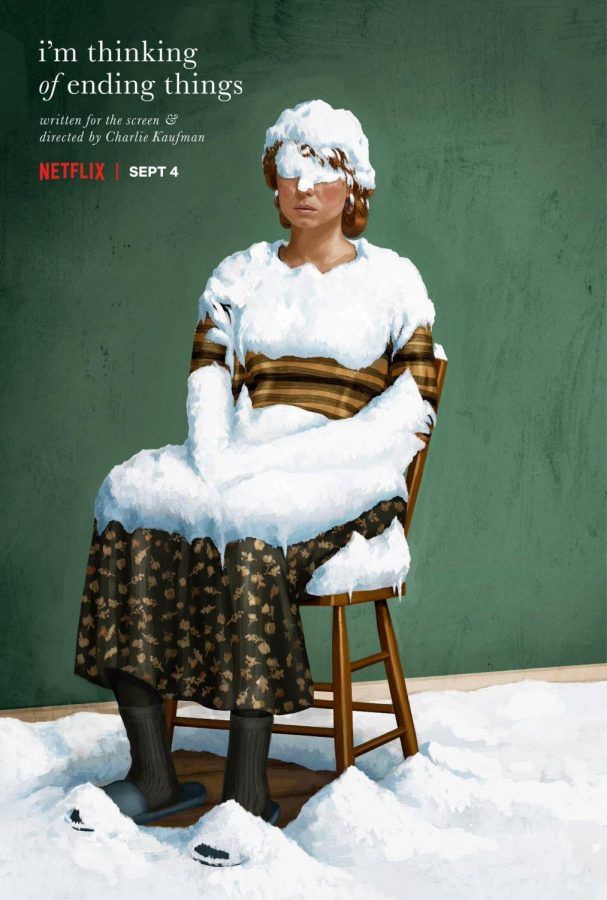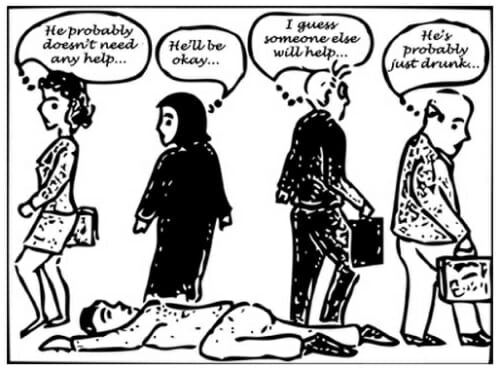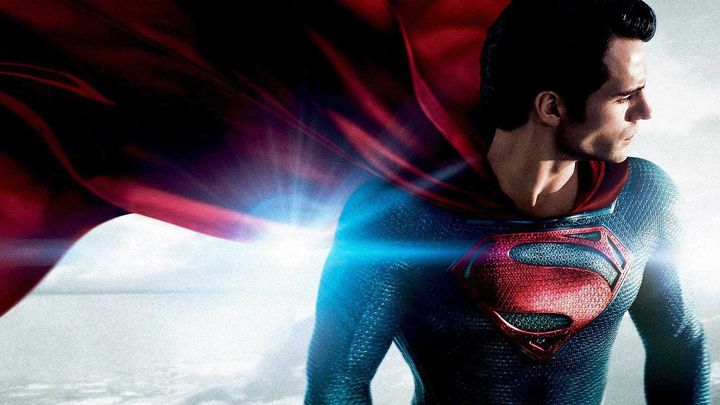Never Stop Thinking of I'm Thinking of Ending Things
An eerie, nightmarish feeling with dark, blue hues, a reality bending timeline, and disturbing characters...this is not a feel-good movie.

An eerie, nightmarish feeling with dark, blue hues, a reality bending timeline, and disturbing characters...
I’m Thinking of Ending Things, adapted from the novel by Iain Reid, follows main character, Jake, and his girlfriend on a road trip to meet Jake’s parents. As simple as this storyline sounds, the movie is anything but.
I’m Thinking of Ending Things was directed by Charlie Kaufman, producer of similar works like Eternal Sunshine of the Spotless Mind. Both films encapsulate Kaufman’s style as a director and screenwriter—psychologically thrilling, mildly confusing, and mind-bending. The films revolve around the complexities and pains of our memories.
In Eternal Sunshine, Kaufman focuses on the effect that memories have on the human psyche through warped or erased memories. Kaufman similarly warps the audience’s concept of time in I’m Thinking of Ending Things. For viewers, there are few distinctions within the film that tell the audience whether the scene is real or imagined in the present or the future. While the film plays with the concept of time, it also comments on the validity of reality.
I'm Thinking of Ending Things alters reality, removing its objectivity, stressing its subjectivity—debatably.

The protagonist, Jake, is notorious for referencing pieces of profound literature. One includes the novel Ice by Anna Kavan, which deals with concepts of sexual assault and climate change—
“A fantasia about predatory male sexual behavior that takes place during an apocalyptic climate catastrophe” (Michaud).
—two themes which conveniently overlap within the film. This allusion is relevant because it is used as commentary on the treatment of women. Predatory behavior is emphasized throughout, but especially in the ballet scene where Jake’s older version of himself as the janitor attacks the girlfriend. This exploration of predatory behavior also explains the prevalence of pigs in the film—rotting pigs in the farm, pigs on billboards, and lastly a pig walking a naked, adult Jake down the halls of the high school. This reveals how Jake views himself; the pig leads the way for Jake: “Life is not so bad as a pig, it’s easy to be a pig.” His character allows his self-worth to drop to the bare minimum to represent the wasted potential of his youth and the hopelessness of his future.
Jake’s relationship with his mother speaks to misogyny within the film. Jake harbors resentment and anger towards his mother. His internal issues with his mother and their shared past negatively reflect on Jake’s current relationships with women in his adult life. This misogyny overlaps with themes of time and age: as Jake’s mother ages and eventually dies, his appreciation and respect for her increases.

Along with literary references, Jake frequently mentions the musical Oklahoma! The film's climax pulls directly from the ballet scene in Oklahoma! Laurey, the musical's lead, dreams of life with her lover, Curley, but then slips into a nightmare caused by the disconcerting presence of rival suitor Jud. In I'm Thinking of Ending Things, the girlfriend and Jake break into similar ballet number.
Other similarities between these scenes include the following:
- Both women are fought over like objects
- In Oklahoma!, Jud falls on his knife and dies but in I’m Thinking of Ending Things, the janitor stabs Jake to get his hands on the girlfriend.
Accompanying this dramatic choreography is a beautiful score composed by Jay Wadley. Wadley wanted the score to feel familiar yet reinterpreted... if you listen closely you can hear parts that draw from Claude Debussy’s “Clair de Lune.” The sound accentuates the melancholy feel of the movie and edges towards the score of a horror film, but does not cross the line. The entire score is layered with elements from the ballet number, chopped up or played backwards, so when the ballet finally occurs it draws the entire sound of the movie together, once again accentuating the warping of time. Thus, time does not follow a traditional order.
The final reference to Oklahoma! is the concluding scene of Jake performing the song “Lonely Room.” The song, sung by Jud just before he is killed, declares his intention to get Laurey. The song emphasizes Jud's insanity. He is a sexual predator, a possible killer, and an outcast, similar to Jake. His desire for Laurey's love builds up to this final breaking point. It is only fitting that at the janitor's apex of loneliness he sings this swan song before he ends his life.
The sporadic timeline not only makes the audience question what’s real, but it also forces reconsideration of the relationship between time, age, and youth. Jake is seen at two different stages in his life. Jake’s parents are also seen suddenly aging, and his mother dies. She relies on Jake’s care and his girlfriend is impressed by his attentiveness. She says to Jake, “We tend to warehouse our elderly”, meaning that we set them aside and leave them for nobody but themselves. This quote suggests that we do not value people once they reach a certain age. She points out the negative portrayal of age throughout the film and how it is rare for children to care for their elderly parents.
Age is depicted as a debilitating burden. His parents’ dementia ties to another theme of the movie-- mental illness. The basis of the movie is Jake struggling to decide whether to end his life or not. This internal battle ties into the double meaning of the film’s title, I’m Thinking of Ending Things. He imagines the girlfriend and other characters in the movie. These other personalities could mean Jake has schizophrenia or multiple personality disorder—similar to Fight Club and the narrator imagining Tyler Durden and Marla Singer.
Jake also references "Intimations of Immortality from Recollections of Childhood" by William Wordsworth. This allusion intertwines themes of age, time, and altered reality from the film. Wordsworth’s ode is about aging and the faded glories of youth (i.e., Jake's entire rationale for his lack of self-worth and internal doubts). This also relates to the pain of Jake’s parents who suffer from memory loss and sadness as they age. In the ode, the narrator is not in tune with reality, much like Jake who is always in a disassociated state of switching between memories.
This film is not a feel-good, family movie. I’m Thinking of Ending Things is for the audience who likes having things left for interpretation, who likes to walk away from the film with much to think about. The film incites introspection, and this is its gift. We would recommend this film but only to those willing to investigate its many, many twists and allusions.


